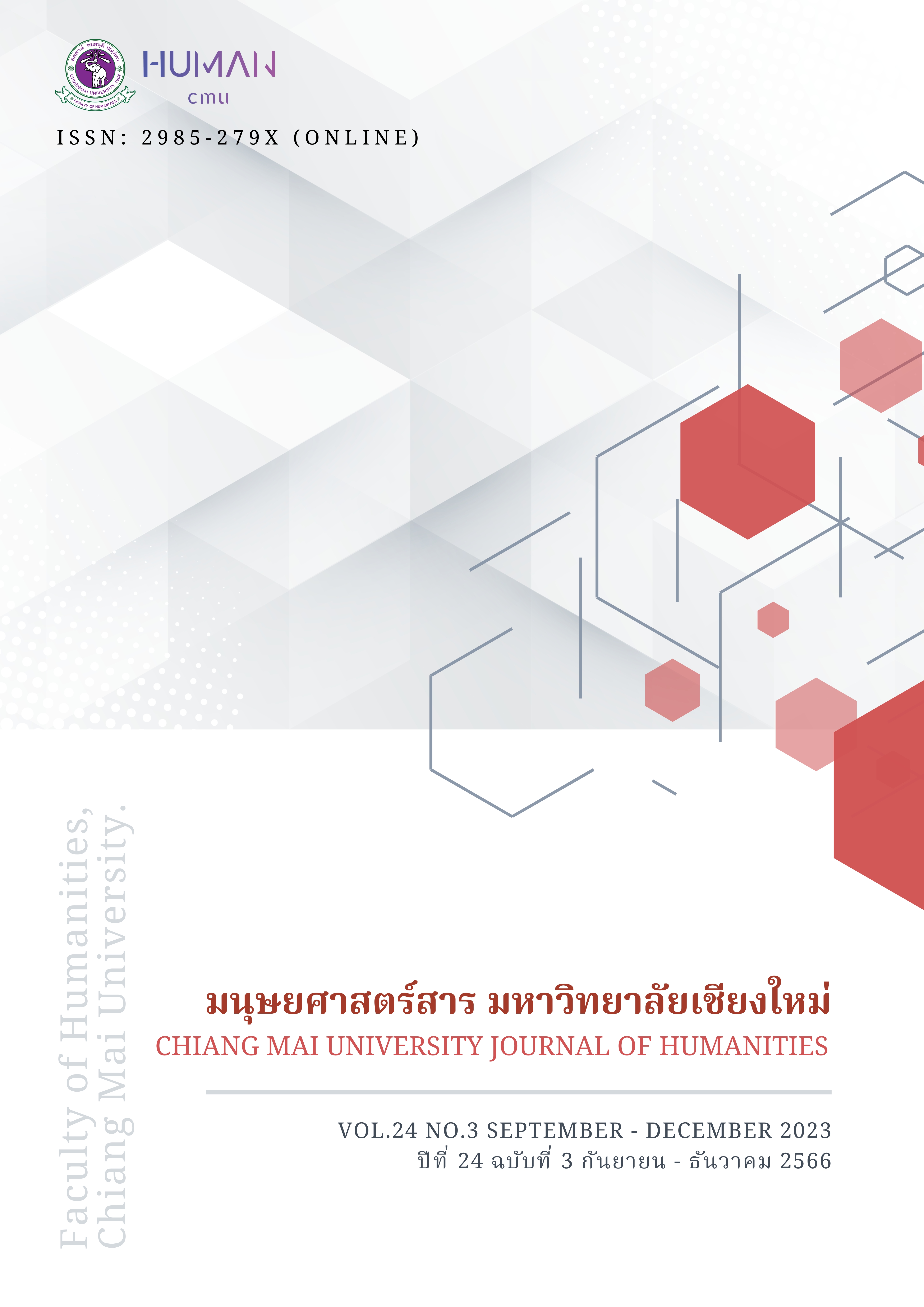ภูมิปัญญาของบรรพบุรุษชนพื้นเมืองในฐานะกระบวนทัศน์กระแสทางเลือกสำหรับสังคมโลก กรณีศึกษาภาพยนตร์เรื่อง จอมคนป่าอสรพิษ โดย ซีโร เกร์รา
Main Article Content
บทคัดย่อ
บทความนี้มีวัตถุประสงค์เพื่อศึกษาชุดคุณค่าของความรู้ของบรรพบุรุษชนพื้นเมืองในลาตินอเมริกาตามแนวคิดความสัมพันธ์ระหว่างวัฒนธรรมและวิเคราะห์การนำเสนอแนวคิดดังกล่าวที่ปรากฏเห็นในภาพยนตร์เรื่องที่ศึกษา โดยอาศัยกรอบแนวคิดทางสังคมและประวัติศาสตร์ลาตินอเมริกาในการวิเคราะห์บริบทของภาพยนตร์ พร้อมกับนำทฤษฎีด้านการสื่อสารมวลชนคือ “ดัชนีเล่าเรื่อง” มาใช้ในการวิเคราะห์ความหมายโดยนัยของสัญญะที่ปรากฎในภาพยนตร์ จอมคนป่าอสรพิษ จากการวิเคราะห์พบว่า (1) ชุดคุณค่าของความรู้ของบรรพบุรุษชนพื้นเมืองให้ความสำคัญในการอยู่ร่วมกันของทุกสรรพสิ่งในจักรวาลอย่างสมดุลและยั่งยืนในฐานะปรัชญาแห่งชีวิต (2) การอนุรักษ์ความรู้ของชนพื้นเมืองเป็นแนวทางหนึ่งในการปลดปล่อยพื้นที่นั้น ๆ เป็นอิสระจากแนวคิดความเป็นอาณานิคมและส่งเสริมสิทธิในการปกครองตนเองของภูมิภาคลาตินอเมริกา ซึ่งสามารถนำไปสู่การเปลี่ยนแปลงในสังคมที่ทุกคนมีส่วนร่วมอย่างเท่าเทียมและเสมอภาคกัน (3) ภาพของชนพื้นเมืองถูกนำเสนอด้วยลักษณะของชนกลุ่มน้อยที่ได้รับผลกระทบจากการสร้างความทันสมัยของประเทศ ทำให้ต้องหาวิธีสืบทอดองค์ความรู้อันเป็นอัตลักษณ์ของชุมชนของตนเพื่อไม่ให้เลือนหายไปกับการพัฒนาในโลกเสรีนิยมใหม่
Article Details

อนุญาตภายใต้เงื่อนไข Creative Commons Attribution-NonCommercial-NoDerivatives 4.0 International License.
เอกสารอ้างอิง
ภาสุรี ลือสกุล. (2561). สัจนิยมมหัศจรรย์ในลาตินอเมริกา: ประวัติศาสตร์ ชาติพันธุ์ วรรณกรรม. กรุงเทพฯ: คณะอักษรศาสตร์ จุฬาลงกรณ์มหาวิทยาลัย.
Aman, R. (2015). Why Interculturalidad Is not Interculturality. Colonial Remains and Paradoxes in Translation Between Indigenous Social Movements and Supranational Bodies. Cultural Studies, 29(2), 205-228.
Andres, M. I. (2022). Latin America at the Oscars. Prensa Latina. https://www.plenglish.com/news/2022/02/27/latin-america-at-the-oscars/
Archila, M. (2010). Significado del bicentenario de la independencia para los indígenas colombianos. Bucaramanga, Colombia: Departamento de humanidades. Universidad Santo Tomás.
Argüello-Guzmán, R. (2014). El Lector como cazador (de sentidos). Cómo leer narraciones a partir de huellas, indicios y símbolos. Bogotá: Editorial Net Educativa.
Casement, R. (1997). The Putumayo Journal. In A. Mitchell (Ed.), The Amazon Journal of Roger Casement (pp. 118–138). London: Anaconda Editions.
CEPAL: Comisión Económica para América Latina y el Caribe. (2015). Folleto Amazonas posible y sostenible.
Cinemateca Distrital. (2012). Cine y video indígena: del descubrimiento al autodescubrimiento. Cuaderno de cine colombiano. Bogotá: Ministerio de Cultura. https://idartesencasa.gov.co/artes-audiovisuales/libros/cuadernos-de-cine-colombiano-no-17a-cine-y-video-indigena-del
DANE: Departamento Administrativo Nacional de Estadística. (2019). Grupos étnicos - Información técnica. https://www.dane.gov.co/index.php/estadisticas-por-tema/demografia-y-poblacion/grupos-etnicos/informacion-tecnica
Díaz Cañadas, G. M. (2006). El Patrimonio Fílmico del Chocó. Bogotá: Ministerio de Cultura. https://babel.banrepcultural.org/digital/api/collection/p17054coll10/id/2772/download
Dietz, G. (2017). Interculturalidad: una aproximación antropológica. Perfiles educativos, 39(156), 192-207. http://www.scielo.org.mx/scielo.php?script=sci_arttext&pid=S0185-26982017000200192&lng=es&tlng=es
Eco, U. (1994). Signo. Colombia: Editorial Labor.
El País & Colprensa. (2016). Lo que hay que saber sobre El Abrazo de la Serpiente. El País. https://www.elpais.com.co/entretenimiento/lo-que-hay-que-saber-sobre-el-abrazo-de-la-serpiente.html
Estermann, J. (2012). Filosofía Andina: Sabiduría para un nuevo mundo. La Paz: Instituto Superior Ecúmenico Andino de Teología (ISEAT).
Estermann, J. (2015). Más allá de Occidente: Apuntes filosóficos sobre interculturalidad, descolonización y el Vivir Bien andino. Quito: Editorial Abya-Yala.
Fornet-Betancour, R. (1994). Filosofía intercultural. México: Universidad Pontifica de México.
Franco, J. (1993). High-tech Primitivism. The representation of Tribal Societies in Feature Films. In J. King, A. M. López & M. Alvarado (Eds.), Mediating Two Worlds. Cinematic Encounters in the Americas (pp. 81-94). London: BFI Publishing.
Halperin, S. (2023). neocolonialism. Encyclopedia Britannica. https://www.britannica.com/topic/neocolonialism
Helberg Chávez, H. (2017). Filosofía en una sociedad tribal amazónica. Lengua Y Sociedad, 16(2), 9-42. https://doi.org/10.15381/lengsoc.v16i2.22372
Hugo Zenteno Brun (2009). Acercamiento a la visión cósmica del mundo Andino. Punto Cero, 14(18). http://www.scielo.org.bo/scielo.php?script=sci_arttext&pid=S1815-02762009000100010&lng=es&nrm=iso
Hunt, M. H. (2000). Modernization Theory: Ideology or Fad?. Chapel Hill: University of North Carolina Press.
Huntington, S. P. (1968). Political Order in Changing Societies. Yale University Press.
Lértora Mendoza, C. A. (2014). La filosofía en la época de la colonia. In R. Fornet-Betancourt & C. Beorlegui (Eds.), Guía Comares de Filosofía Latinoamericana (pp. 45-72). Granada: Comares.
Lévi-Strauss, C. & Eribon, D. (1996). Conversations with Claude Levi-Strauss. University Of Chicago Press.
Luna, M. & Meers, P. (2017). The Films of Ciro Guerra and the Making of Cosmopolitan Spaces in Colombian Cinema. Alphaville: Journal of Film and Screen Media, (14), 126-142.
McGregor, D. (2011). Aboriginal/Non-Aboriginal relations and sustainable forest management in Canada: The influence of the Royal Commission on Aboriginal Peoples. Journal of Environmental Management, 92(2), 300-310.
Millones, L. & Mayer, R. (2012). La fauna sagrada de Huarochirí. Lima: IFEA-IEP.
Peirce, C. S. (1988). El Hombre, un Signo: El Pragmatismo de Peirce. Barcelona: Editorial Crítica.
Pérez Murillo, M. D. (2013). El cine latinoamericano entre dos siglos, sus claves y temas. Boletín Americanista, 66(1), 81-99. https://raco.cat/index.php/BoletinAmericanista/article/view/271821
Posada, E. (2016). Los caminos de la selva: El abrazo de la serpiente. El Espectador imaginario. www.elespectadorimaginario.com/el-abrazo-de-la-serpiente/
Quijano, A. (2000). Colonialidad del poder, eurocentrismo y América Latina. In E. Lander (Ed.), La colonialidad del saber: eurocentrismo y ciencias sociales. Perspectivas Latinoamericanas (pp. 201-244). Buenos Aires: CLACSO.
Garay Cano, L. A. & Cubides Serrano, E. (2021). Entre lo salvaje y la inocencia: lectura intertextual de La Vorágine y El abrazo de la Serpiente. La Palabra, (40), 1-13. https://doi.org/10.19053/01218530.n40.2021.11630
Schultes, R. E. (1989). Tomado de la traducción al español: El Reino de los Dioses: Paisajes, plantas y pueblos de la Amazonia Colombiana, Bogotá. El Navegante Editores, Fundación Mariano Ospina Pérez, 15-19.
Subgerencia Cultural del Banco de la República. (2015). Teoría de la modernización. https://enciclopedia.banrepcultural.org/index.php?title=Teoría_de_la_modernización
Tatzo, A. & Rodríguez, G. (1988). Visión cósmica de los Andes. Quito: Editorial Abya-Yala.


